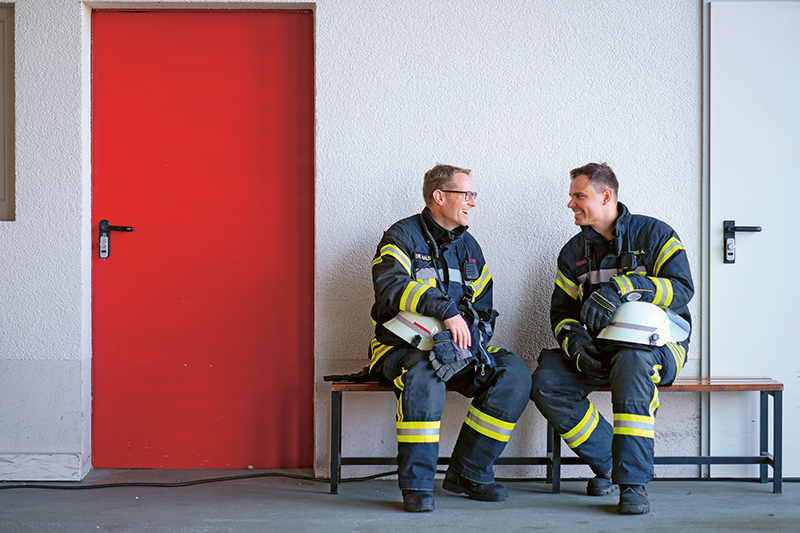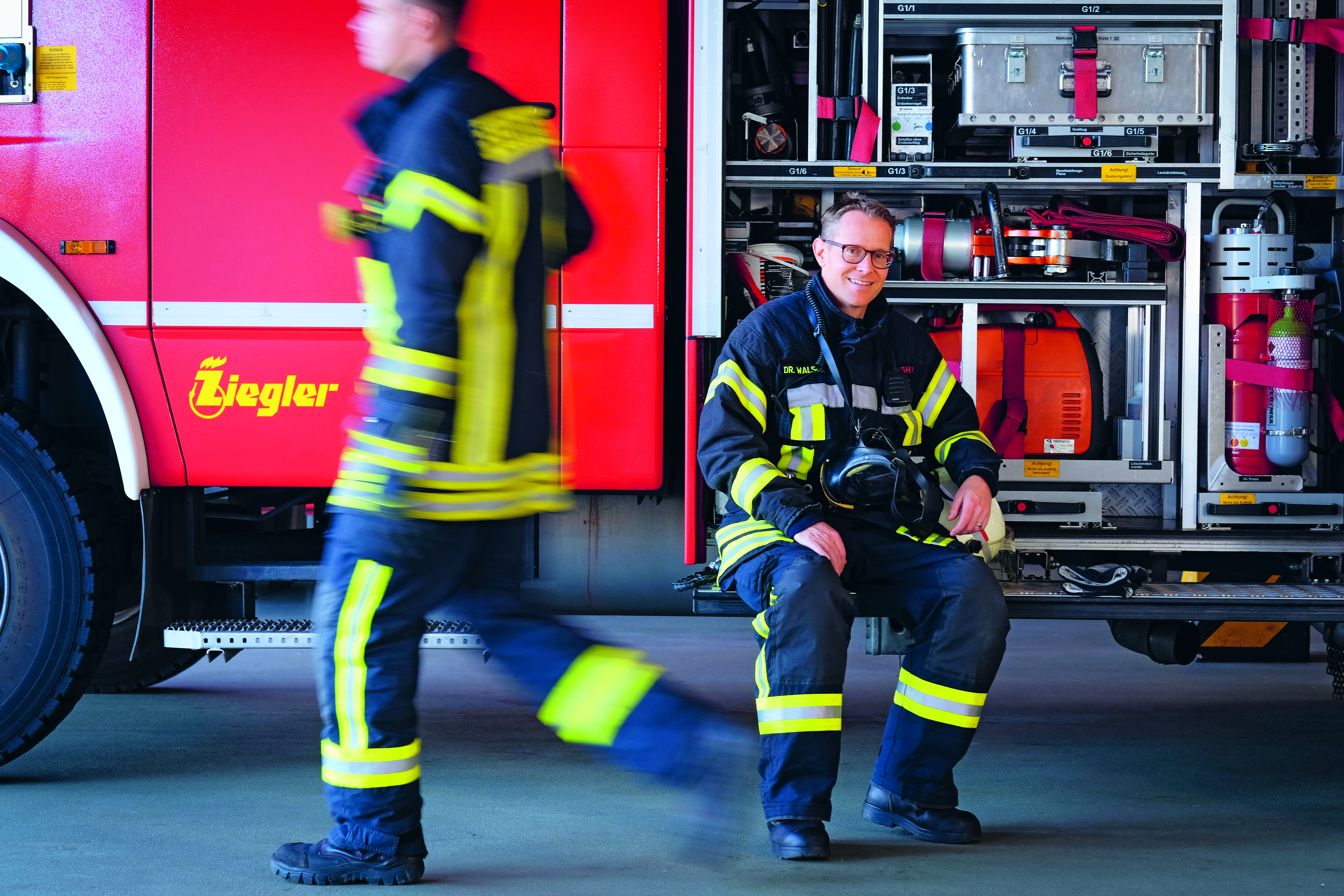In the Heat of the Fire – Keep a Cool Head
Fire, road accident, or rescuing an animal – anyone who dials 112 in Germany can rest assured that help will be on its way in no time at all. Anyone may need to rely on the fire service in an emergency at some point – and in the vast majority of cases, this is manned by volunteers with real-life jobs such as bakers, salespeople, lawyers, car mechanics, and teachers. Or, as in Peter Walsh’s case, a civil engineer with a PhD, who is in charge of real estate management at the Röchling Group in Mannheim.
When an emergency call is made in Germany, this goes to the nearest 24-hour control center, which then springs into action and categorizes the alert according to its level of urgency – a fire is handled differently to a cat stuck up a tree. The volunteer firefighters are then notified via radio – no matter whether they are at work, doing their shopping at the supermarket, out jogging, or tucked up in bed at night. They receive additional text messages via a digital message receiver, which provide more detailed information about the emergency. Each volunteer helper who has been alerted will then decide whether they can participate in the operation or not. Ultimately, the only thing that is important is that enough firefighters actually attend.
“I haven’t experienced a real staff shortage as yet,” says Peter Walsh, who has been a firefighter for over 25 years. However, if this does end up happening, another alert will be sent out and other firefighters will be deployed. Walsh is a member of the volunteer fire service in Landstuhl, which comprises over 70 firefighters in total. They are trained in fire fighting, technical assistance, and environmental protection.
The fire service unit is arranged into two platoons – just one platoon is on stand-by overnight, and both during the day. After being alerted, the firefighters travel to the station, put on their protective equipment, jump in their vehicles, and move out.
“It wasn’t a childhood dream, but the fire service has become a real passion over the years.”

Every Action Must Be Spot-On
Walsh, whose father comes from the borough of Brooklyn in New York City and was himself born in Kaiserslautern, Germany, found out about the volunteer fire service through friends when he was 16 and decided to join. “It wasn’t a childhood dream, but the fire service has become a real passion over the years,” the 43-year-old explains. He has been a youth group leader and district trainer, and also completed his alternative national service with the fire service. Today, he is an emergency incident manager. This means that when he moves out with his team and he is the highest-ranking firefighter on site, Walsh is the one who decides what to do.
Operations are extremely structured – every action must be spot-on and everyone needs to know what to do. Procedures for incident commanders are also clearly regulated. Firstly: identify the situation – this includes a 360-degree survey. Secondly: plan the course of action, including an assessment
of potential hazards and tactical countermeasures. Thirdly: decide and command. “This really simple formula allows us to manage even complex and difficult situations. And I also think it helps people to keep a cool head in situations outside the fire service,” says Walsh.
And he believes keeping a cool head like this is particularly important during an operation, because if a person is stressed, they will only be able to recall a fraction of what they have actually learned. Being scared is not helpful either. He explains that firefighters are trained on how to deal with a potential onset of panic professionally. By his own admission, Walsh does not himself feel scared when he moves out on operations, but he is respectful of the situation. Careful consideration, speed, reliability, and team spirit are other key criteria in ensuring successful operations, and they always head out in groups of at least two. “You need to be able to rely on your colleagues without fail and at all times. Everyone has their own strengths and weaknesses, of course, their own expertise and sometimes gaps in their knowledge too. But when it comes down to it, the one thing that matters is trust.”
For Walsh, trust and reliability are central values, even outside the fire service. During an emergency response, the team needs to trust their incident commander, but the incident commander also needs to trust their team – especially when there is a fire. Technical equipment also needs to be safe and reliable. People’s lives may depend on it – his own and that of others. Walsh explains that technology has improved greatly over the last ten to 15 years.

is respectful of the situation.
Drills and Training Courses
In addition to real-life operations, firefighters also attend numerous drills, training sessions, and courses, both locally and at district and state level. For example, they receive training locally to qualify as breathing apparatus wearers, machine operators, and radio operators. Specialist and leadership courses are held at the Rhineland-Palatinate state fire service academy in Koblenz, leading to qualifications such as group, platoon or unit leader. Walsh has attended various leadership courses. However, this is not something people simply do on the side – it is very time-consuming. When you add in family, work, and hobbies, it can be hard sometimes to fit the fire service in too.
“It’s a case of finding the right balance,” explains Walsh, who is married with three children and likes going jogging, snowboarding, and playing soccer in his free time. For him, one thing is clear: “The fire service is more than just a hobby. It’s part of your life.” Anyone who has chosen to join the fire service must understand that their radio could send out an alert on any given night or while at work during the day.
The fire service regularly comes out on top in surveys on the reputation of professions. Walsh believes that, as a firefighter and volunteer civil servant, you have to treat this responsibility with a sense of care and duty. “People rely on us to help them in a professional capacity, and most of them don’t even know that the majority of us are volunteers. They trust our organization. And I’m proud of that.”





